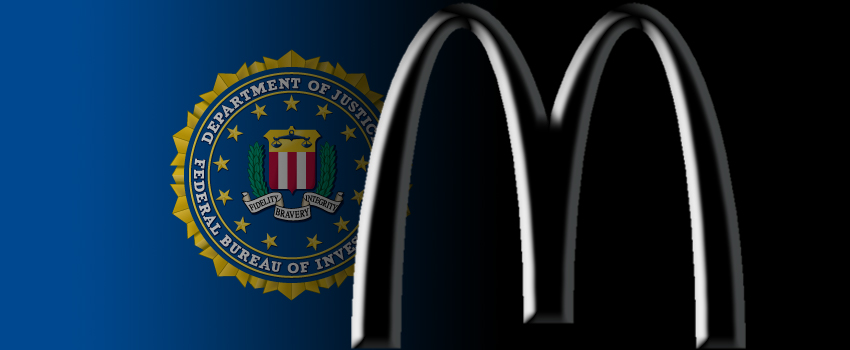Navigating the Complexities of McDonald’s Fraudulent Instant-Win Claims
 Click on this link to visualize the original email: 2023-02-02_1541_0800_Still_off_the_record_ie_website_comparing_apples_and_oranges.pdf
Click on this link to visualize the original email: 2023-02-02_1541_0800_Still_off_the_record_ie_website_comparing_apples_and_oranges.pdf
From:
Vincent B. Le Corre
Subject: [Still off the record/i.e. website] comparing apples and oranges
Date sent: February 2, 2023, 15:41 +0800 (China Standard Time)
To:
Adam Rogalski (Legal Attaché/State Department),
Federal Bureau of Investigation (FBI),
Edward Lehman
Note: since Assistant Legal Attaché Adam Rogalski told me on 2021-09-20 that he was “one of the FBI representatives,” I assume that this communication was transferred to the
Federal Bureau of Investigation (FBI).
Dear Messrs. Rogalski and Lehman,
Mr. Lehman, if you know anyone at the U.S. Embassy, could you please try to find out why the FBI field office refuses to tell what’s the status of the racketeering enterprise criminal investigation in which I am a victim and a key witness. Thank You.
Mr. Lehman, according to The Attorney General Guidelines for Victim and Witness Assistance :
https://www.justice.gov/ag/page/file/1546086/download
Page 21: “Due to sovereignty concerns, many countries limit or prohibit foreign government officials from directly contacting persons within that country’s borders. Therefore, contact with victims and witnesses residing in other countries, for any purpose, needs to be coordinated with the appropriate officials of the host government through either the Department’s Office of International Affairs (OIA) or the United States investigative attaché in the country where the victim resides.”
Do you think it might be one of the reasons why Mr. Rogalski doesn’t answer me? If yes what can we then do to solve this issue? Do we need to notify the Chinese government? Like the Ministry of Justice of the P.R.C.?
Mr. Rogalski, the email I sent you yesterday was mostly written the day before yesterday.
I spent the whole day yesterday thinking about one of the many frauds the criminal entity McDonald’s Corporation committed: the instant-win fraud which is a crime affecting many countries across the world.
Probabilities are very tricky. It can be subtly fallacious.
You and or other people within the State Department and/or FBI and/or the DoJ shouldn’t feel embarrassed for not understanding the fraud immediately. It’s perfectly normal to feel stupid. Many times I had this feeling, a victim once contacted me telling me also that he kind of felt stupid if I recall correctly, and lots of people might feel embarrassed.
Last week, I added a journalist working for Business Insider because he once published an article which is factually wrong on certain aspects. His article is going to be a piece of evidence because it can help understanding different things. But one thing this journalist is right about is that people “Many people assume that all the spaces are equally likely.”
Comparing apples and oranges:
There are different ways to explain and understand the Instant-Win fraud McDonald’s committed. When in doubt, always fall back on this clear, easy to understand, factual, explanation I sent to New York Times journalist Constant Méheut:
https://www.tojournalists.com/open-letters/explanations-sent-to-constant-meheut-may-25-2022/
While I was thinking about this problem again yesterday and this morning, I realized that yes, it’s like comparing apples and oranges.
What determines whether the consumer wins or not? It’s 1 and only 1 game stamp. not 2, nor 3, nor 4, nor 5, nor 20 nor 50. Based on 1 and only 1 game stamp, the consumer knows whether he has won or whether he hasn’t won instantly.
And McDonald’s ruse, their cunning plan, is to mixed up the message.
What McDonald’s, whether in France or in the United States, should have said was simply:
1 chance out of 8 that’s the probability consumers really had and which is never stated anywhere.
And what they tried to do is this:
Criminally state 1 chance out of 4 and relay in the fine print that it’s in reality not a probability calculation but in reality the results of what’s called in mathematics/statistics a Bernoulli trial with the following input interpretation:
Number of trials: 2
Number of successes: 1
Number of failures: 1
Probability of success: 0.125 (i.e. 1 chance out of 8)
Then, the results would indeed be 0.25 or 1 chance out of 4. [IMPORTANT NOTE ADDED ON DECEMBER 27, 2023: I actually made a small mistake. The results would then be about 0.25 and not exactly 0.25. The result is actually more about 0.2344 or 23.44% of chance, so less than 1 chance out of 4. It’s an important detail but I won’t explain why now.]
But because McDonald’s stated it’s a probability calculation, they actually stated something different: as it’s clearly stated in France, the basis is a double winning sticker which by definition is winning since the basis is winning.
In the U.S., they didn’t use the word “winning” but it’s implied when they claim consumers have “1” chance to win.
Besides, 1 chance out of 4, is the basis is a game piece, since it’s a game stamp which determines whether the consumer wins or not, McDonald’s factually claimed:
(1/4)/(1/2) = 1/2
Indeed, 1/4 must be divided by (1 game piece divided by 2 game stamps (since it’s 1 single game stamp which determines the win or not)).
Take a calculator and tried to divide 0.25 by 0.5 and the result is 0.5.
A probability of 0.5 means 50% of chance out of winning, or 1 chance out of 2.
Messrs. Rogalski and Lehman, if you guys are confused, it’s okay. Don’t worry. Just follow these simple steps:
https://www.tojournalists.com/open-letters/explanations-sent-to-constant-meheut-may-25-2022/
It’s enough. If McDonald’s argue that the claim in the U.S. didn’t clarify that the basis was winning, it’s an invalid argument.
Important: I have another piece of evidence which shows, I believe for the year 2011, that in the U.S., in a televised advertising, they claimed the basis was 4 game stamps. You see… since 2 games stamps is different from 4 games stamps, they can never reconcile the explanations they will try to give for say, the year 2016 or 2013, with the year 2011 (if 2011 is the right year). McDonald’s ensnared itself. What they will most likely do is blame the marketing company/ies.
Mr. Rogalski, please make sure the FBI notified INTERPOL. Normally, since I demonstrated to you that McDonald’s committed fraud in the United States, and since this pattern of racketeering activity also took place in other countries, including, but not limited to, Canada, Ireland, Australia, New Zealand, Brazil, France, Poland, Italy, Spain, the U.K., Germany, Switzerland, (totally about 20 countries or more), it’s important for these countries to be formally notified.
It’s one of the biggest fraud in history if not the biggest one.
Best regards,
Vincent Le Corre
Click on this link to visualize the original email: 2023-02-02_1541_0800_Still_off_the_record_ie_website_comparing_apples_and_oranges.pdfTo gain a clearer understanding of the sequence of events in this case, I invite you to view a detailed timeline at the following link:
https://www.ECTHRwatch.org/timeline/mcdonalds/
This timeline provides a comprehensive overview of the key milestones and developments.
